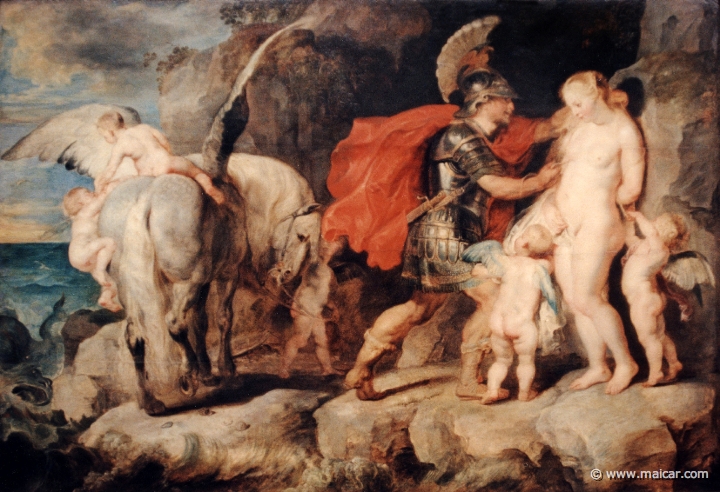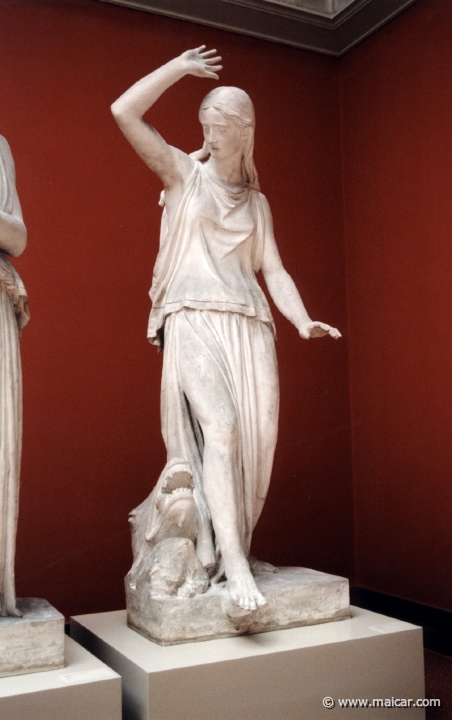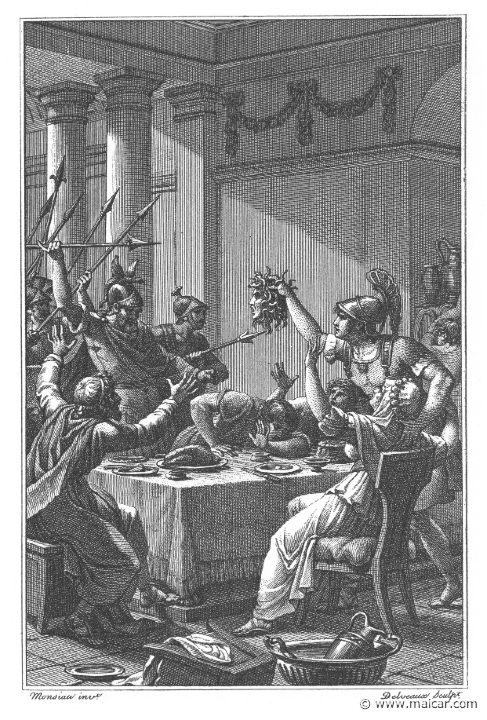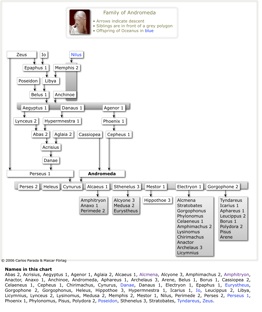 |
|
|

|
Perseus 1 liberates Andromeda. 2316: Perseus befreit Andromeda. Painting by Pieter Paul Rubens, 1577-1640. Gemälde Galerie Kulturforum, Berlin.
|
|
Andromeda is the Ethiopian princess, whom Perseus 1 rescued and married. She became queen of Mycenae and, after her death, a constellation and galaxy.
Boast of Cassiopea 2
Andromeda's mother Cassiopea 2 was extremely proud of her own beauty (and this is practically all we know about her). And so strong was the pride of this Ethiopian queen, that she could not help comparing her beauty with that of the immortal NEREIDS, boasting of being better than they all. For this reason the NEREIDS were angry, and Poseidon, sharing their wrath, sent a flood and a sea-monster to ravage the land.
Charging whoever
Now, when such disasters occur, there always appear clever men equipped with the ability of charging someone with the obligation of compensating the damage, disregarding the issue of true responsibility. So Ammon 3—probably a seer, or someone regarded as a very wise man—declared that the calamity would disappear if the queen's daughter Andromeda were exposed as a prey to the monster. King Cepheus 1 was reluctant to sacrifice his own daughter to the beast, but the despondence of the Ethiopians compelled him to do so. For kings, wishing very much to be liked by their subjects, not seldom obey the irrational pressures of the populace. So King Laomedon 1 of Troy, for example, exposed his daughter Hesione 2 to a monster so that she would pay for his own frauds. And Agamemnon performed a similar deed when he let his daughter Iphigenia be sacrificed at Aulis.
Andromeda chained
So, because of the unrighteous manipulations of Ammon 3, and the cowardice of her own parents, Andromeda was appointed to pay the penalty for her mother's words by being chained to a rock near the sea where the monster that was ravaging the country should destroy her.
|

|
Andromeda chained. 4919: Hermann Wilhelm Bissen 1798-1868: Andromeda, 1857. Ny Carlsberg Glyptotek, Copenhagen.
|
|
Marvellous times
Almost nobody claims nowadays to have witnessed such extraordinary things as those referred in this story. For rulers of the present time, whether male or female, do not usually boast about their beauty. Not yet. And when calamities occur, there are no monsters to devour those who are appointed to pay some penalty, and instead they are fined or cast into prison. Yet despite the terrible monsters and the cruelty of the penalties, those times were happy as well. For also wonderful heroes could appear flying through the sky, which is quite unlikely today. So when Andromeda was chained to the rough cliff about to be devoured by the sea-monster, and her parents were weeping, probably more on account of their own cowardice and guilt than because of their daughter's fate, there appeared in the sky Perseus 1, wearing the winged sandals of Hermes. Having seen the chained beauty, he alighted near her, saying at once:
"Those are not the chains you deserve to wear, but rather those that link fond lovers together!" (Perseus 1 to Andromeda. Ovid, Metamorphoses 4.680).
For a true hero like this one, does not waste his time hesitating or being speechless or shy, but instead he acts expediently, and adds truthful and elegant words to his deeds, joining tenderness to bravery. Then Perseus 1 urged her with questions in order to understand her present condition, and having caught sight of her grieving parents, he said to them:
"That she be mine if saved by my valour is my bargain." (Perseus 1 to Andromeda's parents. Ovid, Metamorphoses 4.703).
The girl's parents accepted his condition and promised him a kingdom as dowry.
The beast killed
Having thus, in a few instants, informed himself of the situation and made all arrangements that were convenient to the case, Perseus 1 proceeded to attack the sea-monster from above until it belched forth water mixed with blood, and then he plunged his sword into the vitals of the beast. Once Perseus 1 had killed the monster he built altars and sacrificed to the gods. Then he claimed Andromeda, who was his prize, and renounced the dowry that her parents had offered him (for heroes care very little for gold).
|

|
01161: Perseus and Phineus. "'Turn away your faces, if any friend be here.' So saying, he raised on high the Gorgon's head." (Ov. Met. 5.178). Guillaume T. de Villenave, Les Métamorphoses d'Ovide (Paris, Didot 1806–07). Engravings after originals by Jean-Jacques François Le Barbier (1739–1826), Nicolas André Monsiau (1754–1837), and Jean-Michel Moreau (1741–1814).
|
|
Plot against Perseus 1
However, while Perseus 1 was celebrating his marriage, Phineus 1, who had been previously betrothed to Andromeda, appeared accusing the guest of stealing his bride. Phineus 1 was son of Belus 1 and Anchinoe. He was the king's brother, but it is also told that Cepheus 1 was son of Phoenix 1. Some say that the name of Andromeda's betrothed was not Phineus 1 but Agenor 10. In any case, King Cepheus 1 explained to the troublemaker that he had lost the girl when he did nothing to defend her when she was exposed to die:
"If this prize seems so precious in your sight, you should have taken it from those rocks where it was chained." (Cepheus 1 to Phineus 1. Ovid, Metamorphoses 5.23).
But Phineus 1 was not the kind of man who would listen to that sort of talk, and so the spear that he did not dare to hurl against the sea-monster he threw against its slayer. A great fight started in the royal halls of Cepheus 1. Many were killed by Perseus 1, while the king, feeling the danger, withdrew from the palace, calling Justice and Faith, and all gods of hospitality, so that they should witness that all that was done against his guest and son-in-law, was also done against his will. And when many had already died, Perseus 1 showed his rival and the remaining chiefs the head of Medusa 1, turning them into stone.In this manner This is how Perseus 1 won the Ethiopian princess Andromeda. She later became queen of Mycenae, a city her husband founded.
Little Perses 2 left behind
But before they left for Hellas, Andromeda gave birth to Perses 2, who stayed behind in Ethiopia because Cepheus 1 had no male offspring. It was from this Perses 2, they tell, that the Persians took their name.
All are constellations
Perseus 1 and Andromeda came to Hellas, where they reigned. But the prowess accomplished by Perseus 1 in Ethiopia was so extraordinary, that the gods decided to commemorate the whole family putting them among the stars. This is why there are constellations named Perseus, Cepheus and Cassiopeia. Andromeda, who nobody could dissuade of leaving parents and country in order to follow her husband, was added to the stars at the request of Athena, and is today a constellation and galaxy. And also the sea-monster was placed among the stars, being the constellation called Cetus.
|
| Family |
|
|
|
|
|
|
|
|
King Cepheus 1 of Ethiopia was the son, either of Belus 1 and Anchinoe, or of Phoenix 1. King Belus 1 of Egypt was son of Poseidon and Libya.
The parentage of Cassiopea 2 is unknown.
|
|

Perseus 1
|
-
Perses 2
-
Alcaeus 1
-
Sthenelus 3
-
Heleus
-
Mestor 1
-
Electryon 1
-
Gorgophone 2
-
Cynurus
|
For more details about these children see Perseus 1.
|
|
|
|
|
|

|
Genealogical Charts
Names in this chart: Abas 2, Acrisius, Aegyptus 1, Agenor 1, Aglaia 2, Alcaeus 1, Alcmena, Alcyone 3, Amphimachus 2, Amphitryon, Anactor, Anaxo 1, Anchinoe, Andromeda, Aphareus 1, Archelaus 3, Arene, Belus 1, Borus 1, Cassiopea 2, Celaeneus 1, Cepheus 1, Chirimachus, Cynurus, Danae, Danaus 1, Electryon 1, Epaphus 1, Eurystheus, Gorgophone 2, Gorgophonus, Heleus, Hippothoe 3, Hypermnestra 1, Icarius 1, Io, Leucippus 2, Libya, Licymnius, Lynceus 2, Lysinomus, Medusa 2, Memphis 2, Mestor 1, Nilus, Perimede 2, Perses 2, Perseus 1, Phoenix 1, Phylonomus, Pisus, Polydora 2, Poseidon, Sthenelus 3, Stratobates, Tyndareus, Zeus.
|
|
|
| Related sections |
|
|
|
Sources
Abbreviations |
Apd.2.4.3-5; Ara.Phae.198, 249; Dio.4.9.1; Hdt.7.61; Hyg.Ast.2.9, 2.11, 2.31; Hyg.Fab.64; Man.1.356., 5.538ff.; Nonn.25.126ff., 47.514; Ov.Met.4.670ff., 5.1ff.; Pau.3.2.2, 3.20.6; Prop.1.3.4., 2.28.21.
|
|
|